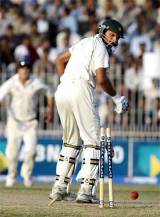Pakistan fail to answer the crucial question
Osman Samiuddin's Pakistan view from the fourth day at Faisalabad
Osman Samiuddin at Faisalabad
23-Nov-2005
|
|

|
When Pakistan eventually finished off England's tail 11 overs into the morning, securing only an inconsequential lead thanks to a comically frustrating last-wicket stand, the question begged an answer. Would Pakistan, maybe on the back of Shahid Afridi's ballast as opener, come out firing, pile on quick runs, and set England an improbable last day target? Or would they hedge their bets, play it safe and see how the day unfolded? A couple of relevant and recent parallels existed as examples of both approaches.
The first is the Bangalore win this year, where Afridi's opening salvo on the fourth afternoon allowed Pakistan time to set India an imposing and eventually winning target on the final day. The difference in circumstances at the time, however, enforced that decision; Pakistan had to win the game to level the series. They were behind in the series and that was the only option.
Today, they had one more option - by virtue of leading the series, they could still harbour thoughts of a draw. By not sending out Afridi to open or at one down, it seemed initially the choice had been made. This is where the second and perhaps more relevant parallel should be referred to. A little over two years ago, in this very stadium, Pakistan arrived leading South Africa in a two-Test series. Incidentally, this was the last time they led in a series against notable opposition. They entered the final day needing a further 294 runs in 92 overs to win the Test and all wickets intact.
Ostensibly, it seemed they had settled for a draw; a painstaking morning session saw the addition of only 55 runs in 30 overs for the loss of one wicket. It was only in the afternoon session that they sniffed the possibility of a win, with Inzamam at the crease, but his dismissal after tea ended those thoughts. In the end, Pakistan hung on, with some dropped chances to thank, for the draw and series win. Pakistan's approach then was neither here nor there. Instead of pressing for a win, they first avoided defeat, then decided to entertain thoughts of winning, before finally finishing tautly, where they began: avoiding defeat.
Although the team has changed much since then (only three players who were involved in that match are in the team now) as well as the circumstances, the hesitancy in approach remains. At one stage, when Younis Khan and Salman Butt were accumulating post-lunch without much gumption, the cricket seemed to have regressed a decade and a bore draw looked the height of their ambition. But later, as Pakistan lost both, an urgency crept into the game. Mohammad Yousuf and Inzamam ran hard and the latter, in particular, pushed for runs. In a quietly fluctuating day, it seemed Pakistan might entertain thoughts of a win by setting a challenging, last-day target.
The problem with this method, of building a platform from which to tentatively launch is that a couple of wickets can show up the perils of any such plan, particularly in a match as tight as this. It happened in the chase against South Africa and it was repeated here, with the dismissals of Yousuf and Afridi off successive deliveries and Kamran Akmal a little later. Those losses meant that the match remains, pleasingly, in the balance still.
The indecision within Pakistan can be defended with some conviction. It can be argued, after all, that a Test series win - with any scoreline - is vital for a side that hasn't won any series in nearly two years. But equally forcefully, it can also be argued that, with another Test match to play, Pakistan should've pressed harder today and sealed the series here.
In any case, the validity of both arguments and Pakistan's subsequent ambiguity of ambition means the match and series now enters a potentially climactic day. A last parallel, as pointed out in the England view is worth bearing in mind - from the Karachi 2000 Test match between these two sides. That loss too emanated from Pakistan dithering between seeking a win and avoiding a defeat at any cost. But given what happened in Multan and that the Pakistan camp is confident a target of 250 is enough, this Test could turn out to be entirely unique, without any parallel to draw on.
Osman Samiuddin is Pakistan editor of Cricinfo